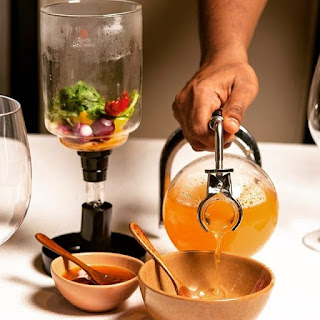We all cook with chemicals !!!
Go into your kitchen' Open your pantry, what do you find?
You may say Common Ingredients like Salt,Sugar,Baking soda etc,
Now what are these? are these not chemicals,
Baking soda oh wait is it not Sodium Bi carbonate !!
Cream of tartar more accurately is potassium hydrogen tartrate,
Vinegar is a friendlier name for Acetic acid,
And one can never give in to say salt is nothing but sodium chloride,
I was never good in chemistry, most of my classmates would vouch on the very fact organic chemistry was my hardest of the lot,
Cooking is chemistry, even the techniques a the same,heating, cooling, purification, dilution, distillation, fermentation, the difference between cooktop and Bunsen burner is what could be said as the major difference,
Flour, The basic component in any bread is nothing but a grinding of an endosperm of wheat grain basically the starchiest part is ground into a powder, to say in scientific terms, Starch is an hydrocolloid thickener,
now what is hydrocolloid?
These are mixture of water and molecules which attach to the water to one another,that slows down the flow of liquid,giving it a thick sauce like consistency,and a concentration more it turns out to be gel,at a set temperature granules can absorb an amazing amount of water to hence form a process called gelation,
After gelation the starch granules tend to break down, leaking 2 sorts of starch molecules, amylose & amylopectin these 2 scientific names are the main cause of flour being the best thickener for sauces, while these 2 are released over too much cooking they form a mesh and prevent the movement of swollen granules, on continuing to cook these molecules will break down again and thus turning the sauce to thin, and that's one prime reason why classical French sauces are cooked for hours meticulously skimmed to remove the starch molecules as they emerge from suspension.
But having said that never try to thicken a sauce with just flour alone, try it and you would learn that the outer layer gels instantly trapping its dry centre, invariably giving you a lumpy gooey gravy, which can be served to the garbage bin on the sink directly.
And that's what mentors did, they trapped the flour around fat either by cooking it to equal proportions calling it roux or by just kneading to make beurre manie in which the starch is released gradually as the fat melts.
My pantry does carry flour but the very core reason to use as a thickener isn't the purpose, Being an eurekan I have trapped seamless ingredients who are much more versatile, these thickners does not require any heat to activate it,nor do they thick sauces which are only hot there are emulsifiers which mix two components of various density , who seem to be a challenge even after vigorous mechanical force of mixing or whipping
Modified food starches are indispensable in the food industry where they are used as stabilisers,emulsifiers and even to stabilise various toppings, for years various other stabilisers like the xanthan which is a counter extract from tapioca flour are used in toothpaste, it ain't a poison so why not use it as a thickener? And thus chefs all around the world are breaking barriers with components in pantry which are getting added every day, Be it Maltodextrin, Gaur gum, pectins these are lot more than chemicals and to be fair these aren't just chemicals, Yet if you aren't convinced that I don't cook with chemicals, I suggest you to stop adding Sodium chloride in your food.



Comments
Post a Comment